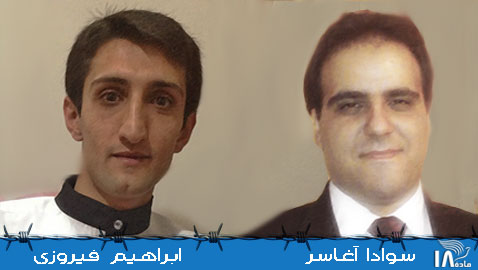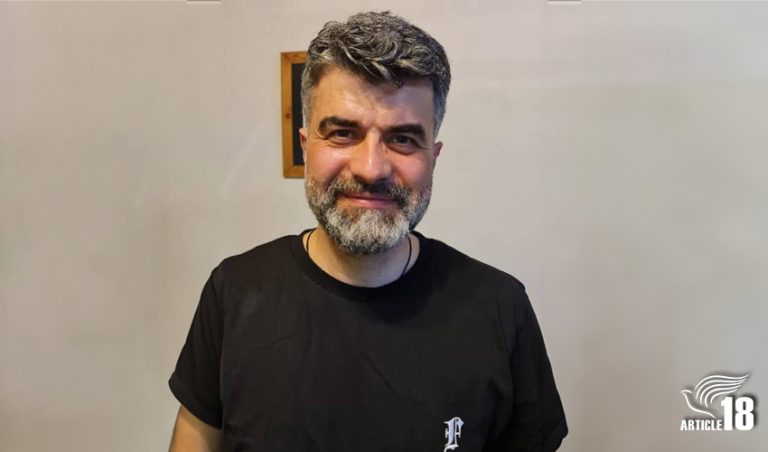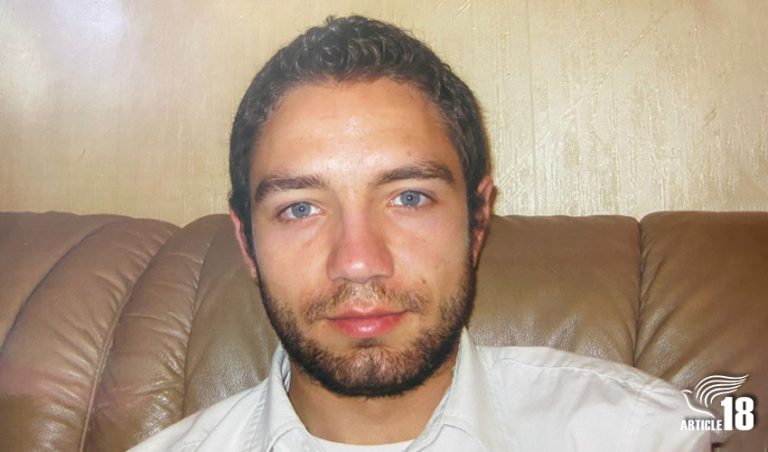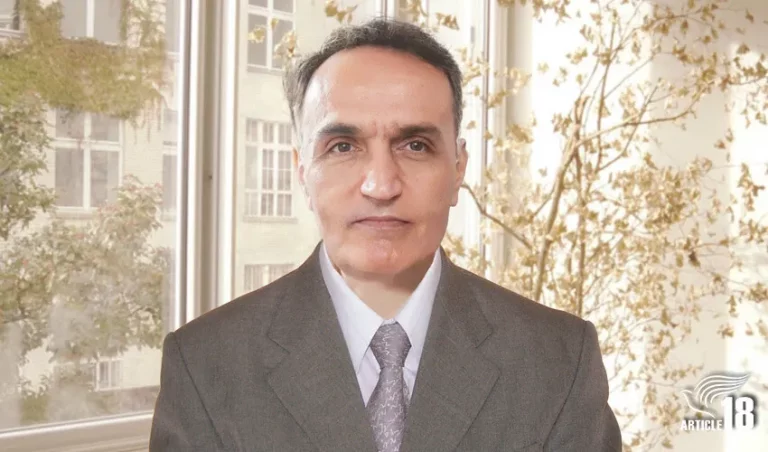
Referenced by
Article18, HRANA, World Watch Monitor
Summary
Sevada Aghasar, an Iranian-Armenian Christian, and Ebrahim Firouzi, a Christian convert, were arrested on 21 August 2013, just a week before Ebrahim was due to be summoned to serve a one-year jail sentence. Ebrahim was due for release on 13 January 2015, but on 8 March 2015 he was re-tried on new charges of “acting against national security by gathering and collusion”. On 20 April 2015 he was sentenced to an additional five years in prison. One week later, Sevada received the same sentence. Their appeals were finally rejected in February and March 2017.
Case in full
On 21 August 2013, Sevada Aghasar, an Iranian-Armenian Christian, and Ebrahim Firouzi, a Christian convert, were arrested during a raid by plain-clothed security officers at their friend Masoud Mirzaei’s place of work. All three men were taken to an unknown location, while Masoud’s home was raided and personal possessions confiscated. Masoud was then released, but Ebrahim and Sevada were detained.
The arrests took place just a week before Ebrahim was due to be summoned to serve a one-year jail sentence he had received on 13 July. Ebrahim was also sentenced to two years in exile in the remote city of Sarbaz, in Sistan-Balochestan province. The official charges against him were “propaganda against the regime by establishing and organising Christian gatherings” and “having contacts with anti-revolutionary networks outside Iran”.
Ebrahim had earlier been arrested on 7 March in Robat Karim, a city near Tehran.He was taken to Evin Prison and kept in solitary confinement for 10 days while being interrogated for his evangelistic activities. He was then released on bail on 29 April after paying IRR 300,000,000 (around $10,500).
Ebrahim was due for release on 13 January 2015, but on 8 March 2015 he was re-tried on new charges of “acting against national security by gathering and collusion”. On 20 April 2015 he was sentenced to an additional five years in prison.
One week later, Sevada received the same sentence.
Their appeals were finally rejected in February and March 2017. A previous hearing had been due to take place on 13 July 2016, but it was postponed after one of the judges failed to appear. Ebrahim had refused to attend that hearing, due to his ill health, but he was beaten and then forcibly taken to the court, only to discover the hearing was to be postponed.
In June 2015, Ebrahim went on hunger strike to protest against being held in a ward with non-political prisoners. After five days, he ended his hunger strike when the officials agreed to improve the conditions of his imprisonment.
In July 2016, Ebrahim’s mother pleaded for her son’s release, saying she needed help due to her worsening health and recent loss of sight. However, her request was rejected and in December 2018 she died and was buried without her son being able to see her or attend her funeral.
Ebrahim previously spent 154 days in Karaj’s Ghezelhesar Prison in 2011. During his detention, following his arrest on 18 January, he was interrogated about his Christian activities and charged with“propaganda against the regime”, “insulting the sacred” (blasphemy) and “acting against national security”.
Sevada was twice given a week’s leave from prison – first in May 2018, and then in April 2019, when he sang in his church choir on Easter Sunday, as was his custom before his imprisonment. He also celebrated his 30th birthday while on leave.
On 21 July 2019, Sevada was granted “conditional release” from prison after serving half of his five-year sentence. He will not have to return providing he upholds the conditions of his release, which includes a prohibition from evangelism.
Ebrahim was released from prison at the end of his sentence on 28 October 2019, but just two weeks later he begun his two-year term in exile in the remote southeastern province of Sistan and Baluchestan. On 11 March 2020, Ebrahim’s exile was extended by 11 months following an “unauthorised” leave of absence.
In November 2020, Ebrahim was threatened with new charges of “insulting the sacred”, which carries a maximum five-year custodial sentence, and “propaganda against the state through promoting the Christian faith”, which can be punished with up to a year in prison, brought by intelligence agents in his location of exile.
However, the local prosecutor dismissed the claims after just 10 minutes.
Authorisation
Article18 was authorised by Ebrahim and Sevada to conduct advocacy on their behalf. The charges against them are entirely unfounded and void of any legal basis. They are instead a reflection of the Islamic Republic’s security-oriented approach towards religious minorities. Neither of them have committed any crime, nor are they seeking to act in any way against the Islamic Republic of Iran. The violations against their religious freedom and human rights is solely a result of exercising their Christian faith.
Recommendations
Article18 petitions the international community to:
- Urge the Iranian Government to uphold its obligations under its own constitution and international law, including provisions for freedom of religion or belief contained within the International Covenant on Civil and Political Rights (ICCPR), to which Iran is a state party.
- Call for the immediate acquittal and release from exile of Ebrahim.
- Call for the swift application of due process in the cases of all who are detained and/or awaiting charges, trials, sentences or appeal hearings on account of their Christian faith and activities.
- Support Professor Javaid Rehman, the UN Special Rapporteur on the situation of human rights in Iran, in monitoring Iran’s compliance with international human rights standards, including freedom of religion or belief.
Background
There has been a significant increase in human rights violations in Iran in recent years, and particularly in the persecution of religious minorities, principally of Christians from the Iranian “house church” movement.
Ethnic Christian communities (Assyrian and Armenian) are permitted a degree of freedom to worship, although it is illegal for these churches to conduct services in Farsi (the national language of Iran and the common language of converts). Bibles and other Christian literature are also illegal in Farsi and those found in possession of such materials, especially in sufficient quantities for distribution, can expect severe treatment and prison sentences. Therefore, the growing community of Christian converts are not permitted to attend recognised churches and they have to gather for worship in secret “house churches” and risk arrest and imprisonment.
In the past few years, a number of Christians have been handed down sentences of between 10 and 15 years, charged with offences such as “acting against national security”. These political charges are used to help avoid international outcry at religiously motivated charges such as apostasy.
Those detained or charged often have to obtain and hand over exorbitant amounts for bail, which are often forfeited as some choose to flee the country in the knowledge that they are very unlikely to receive a fair trial and just verdict. Those awaiting trial who flee the country are tried in absentia. Many will face a gruelling legal process, and until their case is heard, which could take several years, their lives are in limbo.
The majority of the Christians arrested in the last few years have been released, either after finishing their prison sentences or temporarily released on bail with severe warnings and threats against any further Christian activity. Once released, they are closely monitored, and risk re-arrest and imprisonment if they engage, or are suspected of engaging, in any Christian activity.
Iran is 9th on Open Doors’ 2019 World Watch List of the 50 countries where it is hardest to be a Christian. Last year at least 171 Christians were arrested for peacefully practising their Christian faith, as Amnesty International highlighted when referring to 2018 as Iran’s “year of shame”.



0 Comments
Trackbacks/Pingbacks